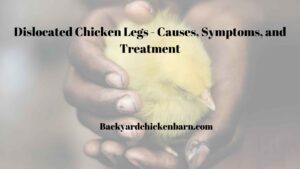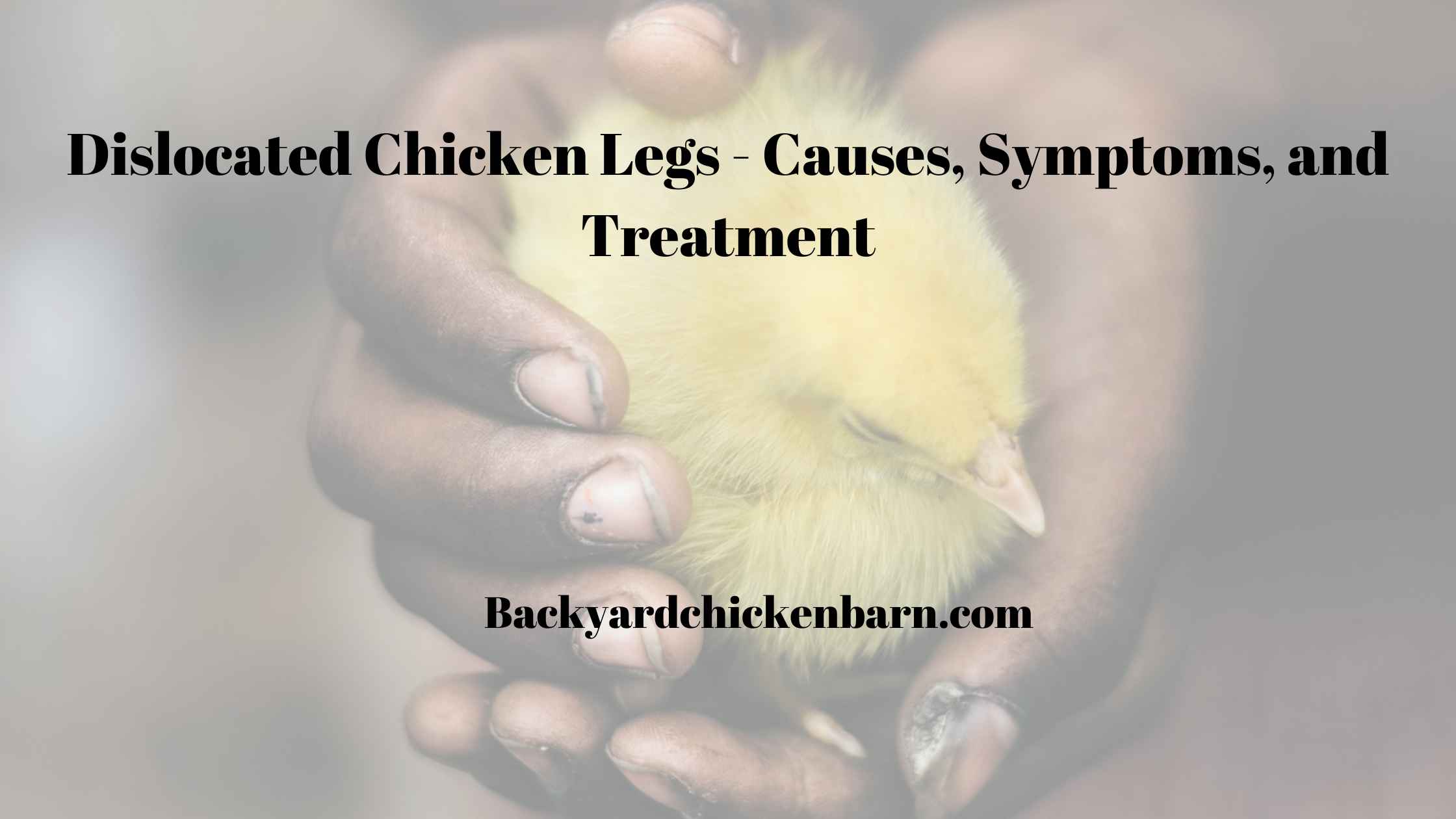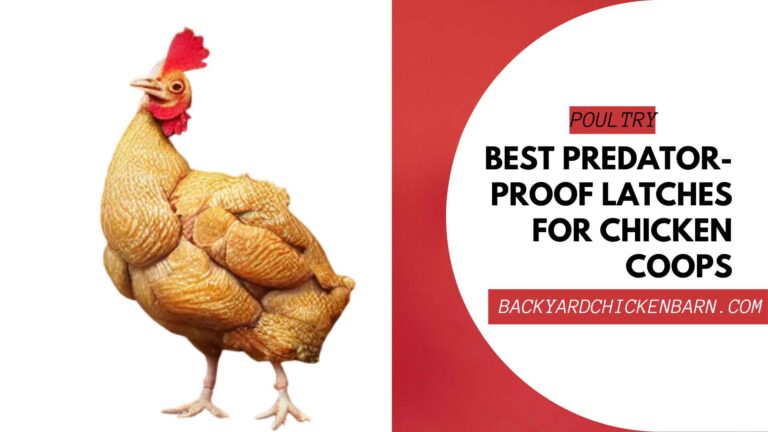Dislocated Chicken Legs – Understanding and Addressing the Issue
A dislocated chicken leg is a concern for poultry keepers, as it can be distressing for the bird and challenging to manage if not addressed promptly. Here’s a comprehensive guide on understanding, identifying, and addressing a dislocated chicken leg.
What is a Dislocated Chicken Leg?
A dislocation refers to a joint injury where the ends of your bones are forced from their normal positions.
In chickens, a dislocated leg means that the thigh bone (femur) or the lower leg bone (tibia or fibula) has been displaced from its joint, causing discomfort and mobility issues for the bird.
Common Causes:
- Trauma: Falls, being trampled by larger animals, or rough handling can cause dislocation.
- Genetics: Some birds might be predisposed to such issues due to genetic factors.
- Poor Nutrition: A diet deficient in certain minerals and vitamins can weaken bones and joints.
- Aggressive Mates: Sometimes, roosters can be overly aggressive, leading to injuries in hens.
Signs and Symptoms:
- Limping: This is the most obvious sign. The bird might avoid putting weight on the affected leg.
- Swelling: The joint area might appear swollen.
- Pain: The bird may vocalize pain, especially when moving or when the area is touched.
- Odd Posture: The bird might sit more or hold its leg at a strange angle.
- Reduced Activity: Affected chickens may become less active and might isolate themselves.
Treatment:
- Isolation: Start by isolating the injured bird from the flock to avoid further injuries.
- Consult a Veterinarian: Always best to consult a vet for proper diagnosis and treatment recommendations.
- Manual Repositioning: If you’re experienced, you might be able to gently manipulate the leg back into position, but there’s a risk if done incorrectly.
- Splinting: Once repositioned, the leg may need to be splinted to keep it in place during the healing process.
- Pain Management: Provide pain relief suitable for poultry; consult your vet for recommendations.
- Nutritional Support: Ensure the bird has a balanced diet to support bone and joint health.
Prevention:
- Safe Environment: Make sure the coop and run are free from hazards that might cause falls or injuries.
- Proper Nutrition: Feed a balanced diet suitable for the age and breed of the chicken.
- Handle with Care: Always handle birds gently to avoid causing injuries.
- Monitor Flock Dynamics: Ensure that aggressive birds are separated or monitored to prevent them from injuring others.
Conclusion:
A dislocated leg in chickens is treatable, especially if detected early. As with all health issues in poultry, the key lies in observation, prompt intervention, and ensuring a safe and nutritious environment for your flock.
Always consult with a veterinarian when in doubt to ensure the well-being of your chickens.
ALSO SEE: Chicken Dislocated Hip

FAQs on Dislocated Chicken Leg:
- Q: What causes a chicken leg to dislocate? A: Common causes include trauma (like falls or being trampled), genetic predisposition, poor nutrition, or aggressive behavior from other chickens.
- Q: How can I tell if my chicken has a dislocated leg? A: Symptoms include limping, swelling around the joint, vocalizing pain, holding the leg at an odd angle, reduced activity, or isolating from the flock.
- Q: Is a dislocated leg fatal for chickens? A: Not directly, but if untreated, complications or secondary issues like infections can arise which can be life-threatening.
- Q: Can I fix the dislocated leg myself? A: While some experienced poultry keepers might attempt to, it’s always best to consult a vet for proper diagnosis and treatment.
- Q: How do I prevent leg dislocations in my flock? A: Ensure a safe environment, provide proper nutrition, handle chickens gently, and monitor for aggressive behavior.
- Q: Should I isolate a chicken with a dislocated leg? A: Yes, to prevent further injury and allow for healing.
- Q: How long does it take for a dislocated leg to heal? A: It varies but usually several weeks. Always consult with a vet for a proper timeline.
- Q: Are certain breeds more prone to leg dislocations? A: While it can happen to any breed, some may have genetic predispositions making them more susceptible.
- Q: Can a chicken live with a dislocated leg? A: With proper care, many chickens can recover and live a full life. However, long-term quality of life should be considered.
- Q: Are chicks more prone to leg dislocations than adult chickens? A: Chicks might be more fragile, but trauma and environment play significant roles in dislocations at any age.
- Q: Is a dislocation different from a fracture? A: Yes. A dislocation is when the bone is displaced from its joint, while a fracture is a break in the bone.
- Q: Can a dislocated leg cause other health issues in chickens? A: Yes, untreated dislocations can lead to infections, decreased mobility, and secondary complications.
- Q: Can a dislocated leg reoccur in the same chicken? A: Yes, especially if the underlying cause is not addressed.
- Q: How can I support a chicken’s recovery after the leg is repositioned? A: Provide a safe space, proper nutrition, pain management, and possibly a splint as recommended by a veterinarian.
- Q: Do chickens feel pain from a dislocation? A: Absolutely. Chickens are sentient beings and feel pain, discomfort, and stress from injuries.
- Q: Can dislocations happen in wings as well? A: Yes, chickens can also experience dislocated wings, though the care and treatment might differ.
- Q: Is a vet visit necessary for a dislocated leg? A: It’s always recommended to consult a vet to ensure proper care and reduce complications.
- Q: What kind of pain relief can I give to a chicken? A: Always consult with a vet before giving any medication, as many human pain relievers can be toxic to chickens.
- Q: Will a chicken with a healed dislocated leg lay eggs? A: If the bird has recovered well and is otherwise healthy, it should be able to lay eggs.
- Q: Can I prevent dislocations with supplements? A: While supplements support overall health, they cannot guarantee prevention. However, proper nutrition can reduce the risk.
- Q: How common are leg dislocations in chickens? A: While not extremely common, they can occur, especially in environments where there are risks of trauma.
- Q: Can a chicken run again after a dislocation? A: With proper care and healing time, many chickens regain full or near-full mobility.
- Q: How do I apply a splint? A: It’s best to get guidance from a vet. Incorrect splinting can cause more harm.
- Q: Should I cull a chicken with a dislocated leg? A: It depends on the severity, the bird’s overall health, and your ability to provide care. Always consider the bird’s quality of life.
- Q: Is there a difference in care for broilers vs. layers with a dislocated leg? A: Basic care is similar, but specific needs may vary due to size and purpose of the bird.
- Q: Are free-range chickens more prone to dislocations? A: Free-range chickens may have more opportunities for injury, but they also have a more natural lifestyle which can be beneficial.
- Q: Can aggressive roosters cause hens to have dislocated legs? A: Yes, overly aggressive roosters can cause various injuries to hens, including dislocations.
- Q: Is surgery an option for a dislocated leg? A: In extreme cases, surgery might be recommended. Consult with a veterinarian.
- Q: Can weather or temperature affect the healing of a dislocated leg? A: Extreme cold or heat can stress the bird and potentially slow healing. Ensure a comfortable environment.
- Q: Are there any long-term side effects of a dislocated leg? A: Some birds might have a slight limp or reduced mobility, even after healing.
- Q: How can I reduce the swelling of a dislocated leg? A: Cold compresses can help, but always consult a vet for recommendations.
- Q: Should I massage a chicken’s dislocated leg? A: Unless advised by a vet, it’s best not to, as you could cause more harm.
- Q: Can egg production be affected by a dislocated leg? A: Stress and pain can temporarily reduce or halt egg production.
- Q: Do roosters get dislocated legs as often as hens? A: Both can get dislocations, but the causes might differ due to their roles and behaviors in the flock.
- Q: Are there any natural remedies for pain relief? A: While some suggest herbs or natural supplements, always consult a vet before administering anything.
- Q: Should I change the diet of a chicken recovering from a dislocation? A: A balanced diet is crucial. Supplements might be recommended, but consult a vet.
- Q: Can older chickens recover from a dislocated leg? A: Age can affect recovery speed, but with proper care, older chickens can recover.
- Q: Can infections occur due to a dislocated leg? A: Yes, untreated or improperly treated dislocations can lead to infections.
- Q: Is physical therapy an option for chickens? A: In some cases, gentle physical therapy might be advised by a veterinarian.
- Q: How can I emotionally support a chicken with a dislocated leg? A: Provide a calm environment, gentle handling, and spend time with the bird to reduce stress.
Remember, always prioritize the well-being of the bird and consult a veterinarian for specific concerns.



